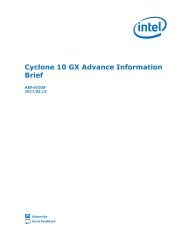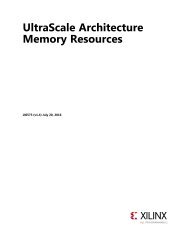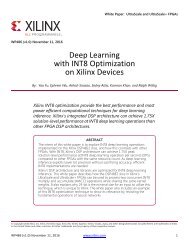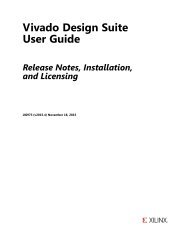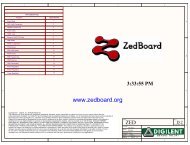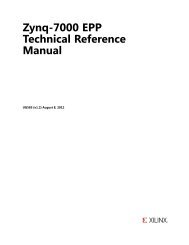UltraScale Architecture Memory Resources
ug573-ultrascale-memory-resources
ug573-ultrascale-memory-resources
You also want an ePaper? Increase the reach of your titles
YUMPU automatically turns print PDFs into web optimized ePapers that Google loves.
Chapter 2: Built-in FIFO<br />
PROG_FULL_THRESH<br />
PROG_FULL_THRESH is a user-defined threshold that defines when a specified number of<br />
words have been written to the FIFO, and can be used to determine the amount of available<br />
space remaining in the FIFO. When the number of words is more than or equal to<br />
PROG_FULL_THRESH, the PROGFULL signal is asserted. If PROGFULL = 0, the number of<br />
words in the FIFO is less than PROG_FULL_THRESH. Similar to the PROGEMPTY assertion,<br />
the PROGFULL flag conservatively represents the number of words in the FIFO relative to<br />
the PROG_FULL_THRESH setting. Therefore, PROGFULL considers all write operations but<br />
might not immediately update due to read operations synchronization latency. Thus, it can<br />
sometimes present the FIFO as being more full than it actually is.<br />
WRITE_WIDTH<br />
This attribute controls the total data width of the DIN and DINP ports together. Valid values<br />
of WRITE_WIDTH are 4, 9, 18, 36, and 72 (FIFO36E2).<br />
READ_WIDTH<br />
This attribute controls the total data width of the DOUT and DOUTP ports together. Valid<br />
values of READ_WIDTH are 4, 9, 18, 36, and 72 (FIFO36E2).<br />
REGISTER_MODE<br />
UNREGISTERED indicates that the FIFO does not use the block RAM output register.<br />
REGISTERED indicates that the output register is used and that the FIFO controls it such that<br />
the FIFO’s DOUT behaves like an additional FIFO word. This setting does not add any latency<br />
to the DOUT but has an impact on clock-to-out and WRCLK to EMPTY deassertion latency.<br />
DO_PIPELINED indicates that the output register adds an additional pipeline stage to the<br />
DOUT path, with REGCE and RSTREG inputs so that the output register can be controlled.<br />
This setting has an impact on clock-to-out and WRCLK to EMPTY deassertion latency.<br />
CLOCK_DOMAINS<br />
COMMON indicates that the FIFO is a common-clock FIFO, and there is only one clock input<br />
(CLK) or two clock inputs (WRCLK and RDCLK) that are tied to the same clock source (single<br />
clock buffer).<br />
INDEPENDENT indicates that the FIFO has two independent and perhaps asynchronous<br />
clocks (WRCLK and RDCLK) coming from two different clock buffers.<br />
<strong>UltraScale</strong> <strong>Architecture</strong> <strong>Memory</strong> <strong>Resources</strong> www.xilinx.com<br />
Send Feedback<br />
66<br />
UG573 (v1.2) February 24, 2015



